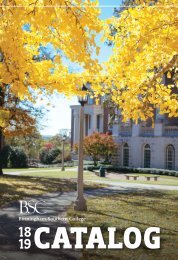2023-2024 BSC Catalog Updated_UG ONLY_FINAL[82]
You also want an ePaper? Increase the reach of your titles
YUMPU automatically turns print PDFs into web optimized ePapers that Google loves.
ACADEMIC PROGRAMS<br />
93<br />
written communication skills. A primary concern of the study of history is change. The<br />
student who is conscious of the continuous process of change is better prepared for the<br />
conditions of change taking place today.<br />
The concentration in public history prepares students for careers and advanced degrees in<br />
public history, an exciting and challenging field that has experienced strong growth in<br />
recent decades. Public historians practice history outside of the academic classroom by<br />
serving as mediators of historical knowledge in partnership with the public and<br />
community institutions through preserving and interpreting historical records and using<br />
them to contextualize important issues for today’s public. This can be done through many<br />
venues and media, including museums, libraries, living history sites, documentary film,<br />
historic preservation, historical societies, government service, and physical and digital<br />
archives. Students graduating with the concentration in public history fulfill the<br />
requirements for the Bachelor of Arts in history and take additional courses, including an<br />
introductory course, an internship with a partnering institution, and other courses outside<br />
of history that complement their training in the field.<br />
Historical study provides a training that also helps prepare students for graduate<br />
study and for widely varied careers in teaching, law, the church, government, social<br />
services, diplomatic service, museums, libraries, business, journalism, and other<br />
fields.<br />
Upon completion of the history major, students will be able to<br />
• articulate a thesis that is historical and argumentative<br />
• compose an historical argument using primary sources in support of an<br />
appropriate thesis<br />
• engage with secondary sources by situating one’s own thesis and argument<br />
within the topic’s historiography<br />
Major Requirements<br />
Major in History<br />
The following courses are required (11 units):<br />
HI 102, and either HI 103 or HI 110<br />
HI 151 or HI 155<br />
HI 152<br />
HI 300<br />
HI 400<br />
five elective units, two at the 200 level and three at the 300 level;<br />
at least one must be in United States history, one in European<br />
history, and one in Latin American, Asian, or Middle Eastern history<br />
Birmingham-Southern College <strong>Catalog</strong> <strong>2023</strong>-<strong>2024</strong>


![2023-2024 BSC Catalog Updated_UG ONLY_FINAL[82]](https://img.yumpu.com/68368591/93/500x640/2023-2024-bsc-catalog-updated-ug-only-final82.jpg)

![2023-2024 BSC Catalog Updated_UG ONLY_FINAL[82]](https://documents.yumpu.com/000/068/368/576/117622bc72155e3c3a86902fd9789544961fab9f/734e4341576f6e62684b6734372b776e7666623165513d3d/32586978355852796d43786d567256654839567a64773d3d.jpg?AWSAccessKeyId=AKIAICNEWSPSEKTJ5M3Q&Expires=1717315200&Signature=fDhKeoa%2Fzadu%2BpT6tQfbiZFzy9o%3D)